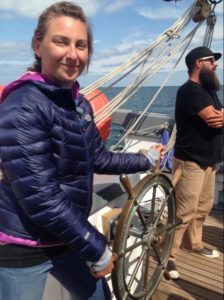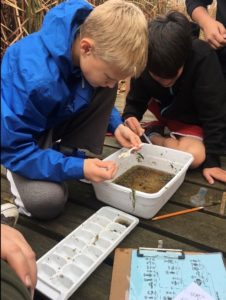By Elise Ertl, University of Wisconsin-Superior
Sarah DeZwarte, education director at YMCA Camp Y-Koda in Sheboygan, Wisconsin, had the opportunity to, not only once, but to twice take part in the Lake Guardian teacher cruise and Shipboard Science Workshop. While each trip entailed a different experience, both provided fundamental learning and education that DeZwarte was able to carry on to the students and residents of the Lake Michigan coastal area.

Sarah DeZwarte
DeZwarte believes that the knowledge of students and community has the power to change how we treat our environment and ecosystems, especially when speaking locally. After her experience with the Lake Guardian teacher cruise and the Shipboard Workshop, DeZwarte is taking her knowledge and collaborating with the Sheboygan Area School District to inform and create field experiences for students to learn about Lake Michigan.
“In the past, they’ve been learning about Arctic ecosystems, which is great, but that is not in their backyard. We’ve been able to provide new textbooks for students to learn about Lake Michigan for about a month and then, I will meet with them at Kohler-Andrae State Park, where we will do three different activities. They will then continue learning about Lake Michigan for the next three weeks,” DeZwarte said.
The most important thing to DeZwarte is that kids in her area are finally able to learn about Lake Michigan.
One activity DeZwarte carries out with students is to collect macroinvertebrates using leaf bags, which are mesh bags filled with leaves that soak in a wetland for 21 days prior to the activity. The macroinvertebrates will make their way into the bag and slowly work on decomposing and shredding the material. All the students need to do is pour the bag contents into a pan and then they can pick out and identify the macroinvertebrates present. The other two activities involve piping plovers and sturgeon. These activities show the productivity of the coastal wetlands and just how important every part is to its success.

Students from YMCA Camp Y-Koda learn about macroinvertebrates from Lake Michigan.
Developing these activities for kids has provided them with an early, real-world experience that gives them a taste of what research is like. It inspires them to learn about their local area and protect environmental areas that already exist right before their eyes and in their backyard and hopefully, continue to spread their knowledge throughout their communities.
The Shipboard Science Project has not only impacted local students but also DeZwarte herself. “As an educator, I’ve been impacted in terms of my passion. Whenever you get to be a scientist yourself, I think it just elevates your ambition to share it with children.”
These experiences have elevated DeZwarte’s opportunities and need to reach out to her community about the importance of being aware of local ecosystems and environments.


